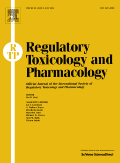
REGULATORY TOXICOLOGY AND PHARMACOLOGY
Scope & Guideline
Advancing the Frontiers of Drug Safety and Toxicology
Introduction
Aims and Scopes
- Chemical Risk Assessment:
The journal prioritizes research on methodologies for evaluating the risks posed by chemical substances, including pharmaceuticals, agrochemicals, and industrial chemicals, ensuring that safety assessments are scientifically robust and regulatory compliant. - Innovative Methodologies:
A significant emphasis is placed on the development and validation of New Approach Methodologies (NAMs), which promote alternatives to traditional animal testing, such as in vitro assays, computational models, and other innovative techniques. - Pharmaceutical Safety Evaluations:
Research articles frequently focus on the safety assessment of drugs, including preclinical studies, toxicokinetics, and the implications of impurities, ensuring that pharmaceutical products meet stringent safety standards. - Environmental Toxicology:
The journal includes studies on the environmental impacts of chemicals, assessing exposure pathways, ecological risks, and the implications of human exposure to environmental toxicants. - Regulatory Frameworks and Policy Discussions:
Research often discusses regulatory frameworks, harmonization efforts, and policy implications related to toxicology and pharmacology, aiming to guide and inform regulatory practices globally. - Biomonitoring and Human Exposure Studies:
The journal features studies that assess human exposure to chemicals through biomonitoring techniques, aiming to evaluate health risks and inform public health policies.
Trending and Emerging
- Next Generation Risk Assessment (NGRA):
There is a growing trend towards integrating NGRA frameworks that utilize modern methodologies, including in silico predictions and machine learning models, to enhance the accuracy and efficiency of risk assessments. - Focus on Impurities and Contaminants:
Research increasingly addresses the risks associated with impurities and contaminants in pharmaceuticals and consumer products, with a particular emphasis on N-nitrosamines and other potentially harmful substances. - Ecotoxicology and Environmental Impact Assessments:
Recent publications reflect a heightened focus on the environmental impacts of chemicals, including studies on the ecotoxicity of substances and their effects on ecosystems, indicating an increased regulatory emphasis on environmental safety. - Biomonitoring and Human Health Studies:
The trend towards biomonitoring human exposure to chemicals is on the rise, with studies employing innovative techniques to assess exposure levels and their associated health risks, thereby informing public health policies. - Regulatory Harmonization Initiatives:
There is an increasing emphasis on regulatory harmonization efforts across jurisdictions, reflecting a global trend towards aligning safety assessment practices to facilitate international trade and public health protection.
Declining or Waning
- Traditional Animal Testing Methods:
There has been a noticeable decrease in the publication of studies reliant on traditional animal testing methods, as the field shifts towards NAMs and alternative testing strategies that emphasize reduction and refinement in animal use. - Historical Toxicological Data Analysis:
Research focusing solely on retrospective analyses of historical toxicological data has waned, possibly due to a growing preference for studies that integrate modern methodologies and real-time data analysis. - General Toxicological Profiles:
Submissions that provide broad or generic toxicological profiles without specific regulatory implications or innovative methodologies are less frequently seen, indicating a trend towards more focused and impactful research. - Single-Agent Toxicity Studies:
The emphasis on studies evaluating the toxicity of single agents in isolation is declining, as there is an increasing interest in understanding the effects of chemical mixtures and cumulative exposures. - Conventional Risk Assessment Models:
There is a reduction in the use of conventional risk assessment models that do not incorporate advanced statistical or computational techniques, reflecting a shift towards more sophisticated approaches in risk evaluation.
Similar Journals
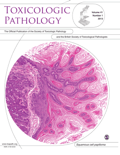
TOXICOLOGIC PATHOLOGY
Bridging Toxicology and Pathology for Enhanced Public HealthTOXICOLOGIC PATHOLOGY, published by SAGE Publications Inc., is a dedicated journal that serves as a pivotal platform for researchers and professionals in the fields of toxicology and pathology. With an ISSN of 0192-6233 and E-ISSN of 1533-1601, the journal has been committed to advancing knowledge since its inception in 1972. It boasts impressive rankings in the recent 2023 category quartiles, achieving Q2 in Pathology and Forensic Medicine, and Q3 in Cell Biology, Molecular Biology, and Toxicology, marking it as a significant contributor to these vital disciplines. Despite its non-open access status, the journal ensures accessibility through various premium library subscriptions, providing readers with essential insights on toxicologic and pathologic research, advancing both academic inquiry and practical applications. Researchers, students, and industry professionals alike will find TOXICOLOGIC PATHOLOGY an indispensable resource, offering high-quality peer-reviewed articles that explore the complex interactions between substances and biological systems, with the aim of improving public health and safety.

Toxics
Connecting global minds for a healthier environment.Toxics is a leading international journal published by MDPI that has been dedicated to advancing the knowledge in the fields of toxicology, environmental health, and chemical safety since its inception in 2013. With an impressive Open Access model, it ensures that all research findings are readily available to a global audience, fostering collaboration and innovation across academia and industry. The journal is esteemed for its rigorous peer-review process and holds notable rankings, including Q1 status in Chemical Health and Safety and Q2 in both Health, Toxicology and Mutagenesis and Toxicology, reflecting its impact on critical research areas. Based in Basel, Switzerland, Toxics provides a platform for researchers, professionals, and students to disseminate significant findings on the implications of toxic substances in health and the environment, aiming to improve public health outcomes and inform regulatory decisions. With its ongoing commitment to high-quality research and relevant access options, Toxics continues to be an essential resource in the domain of toxicology and environmental sciences.
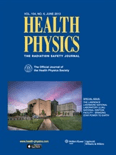
HEALTH PHYSICS
Transforming Research into Public Health InsightsHEALTH PHYSICS is a leading academic journal dedicated to the study and dissemination of knowledge in the fields of radiology, epidemiology, and health toxicology. Published by Lippincott Williams & Wilkins, this esteemed journal has been a cornerstone of research since its inception in 1958, and it continues to foster important discussions and advancements in the discipline. With a notable impact factor and consistently ranking in the Q2 and Q3 quartiles across various categories in 2023, HEALTH PHYSICS serves as a vital resource for scholars, practitioners, and students seeking the latest insights and methodologies in the management of radiation exposure and its health implications. While the journal does not offer open access, it remains a critical platform for peer-reviewed articles that contribute to public health and environmental safety. The journal's comprehensive scope and historical significance underscore its importance in advancing knowledge and practices within its field, making it an essential read for anyone engaged in the multidisciplinary realms of health physics.

Toxicological Research
Exploring the intricate relationship between substances and health.Toxicological Research is a prominent academic journal dedicated to advancing the field of toxicology through rigorous exploration and innovative research. Published by the Korean Society of Toxicology, this journal serves as a vital resource for researchers, professionals, and students engaged in environmental science, pharmacology, and toxicology. With an ISSN of 1976-8257 and an E-ISSN of 2234-2753, Toxicological Research highlights significant findings and discussions in the realm of health, toxicology, and mutagenesis. Although not an open-access journal, it maintains a solid reputation as evidenced by its Q3 ranking in both health-related toxicology and general toxicology categories for 2023. The journal covers a broad spectrum of topics from fundamental research to applied toxicology and provides a unique platform for the dissemination of knowledge in a field that is increasingly relevant in today’s society. With an anticipated convergence period from 2008 to 2024, Toxicological Research continues to contribute vital insights to understanding the implications of toxic substances on health and the environment.
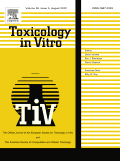
TOXICOLOGY IN VITRO
Pioneering Innovative Toxicology ResearchTOXICOLOGY IN VITRO is a premier journal published by PERGAMON-ELSEVIER SCIENCE LTD, focusing on the latest advancements in the field of toxicology, particularly through in vitro methodologies. With an ISSN of 0887-2333 and an E-ISSN of 1879-3177, this journal serves as a critical platform for researchers aiming to disseminate their findings in toxicology, emphasizing innovative approaches and applications in pharmacology and toxicology. Featuring a commendable impact factor and classified in the second quartile (Q2) for both Medicine (miscellaneous) and Toxicology in 2023, the journal holds a significant position within the academic community, ranking 41st out of 133 in the Toxicology category according to Scopus, representing the 69th percentile. Despite being a subscription-based publication, it continuously attracts submissions from leading scientists worldwide, fostering a vibrant exchange of scientific knowledge. Since its inception in 1987, TOXICOLOGY IN VITRO has consistently aimed to enhance understanding of toxicological challenges, making it an invaluable resource for professionals, students, and researchers dedicated to developing safer pharmaceuticals and understanding the biological pathways influenced by potential toxic agents.

JOURNAL OF APPLIED TOXICOLOGY
Innovating Toxicology Research for a Safer TomorrowJOURNAL OF APPLIED TOXICOLOGY, published by Wiley, stands as a leading platform in the field of toxicology, focusing on the rigorous examination of chemical substances and their effects on biological systems. With an impressive Impact Factor, it ranks in the top quartile (Q2) for toxicology journals, reflecting its esteemed position within the scientific community. The journal, identifiable by its ISSN 0260-437X and E-ISSN 1099-1263, has been an invaluable resource since its inception in 1981, and it continues to serve as a conduit for innovative research and practical applications through 2024. Positioned at the forefront of the field, it garners recognition in the Scopus Rankings, where it ranks #31 out of 133 journals in the toxicology category, placing it in the 77th percentile—a testament to its contribution to the advancement of pharmacology and toxicological sciences. While not an open-access journal, it remains accessible to a wide audience of researchers, professionals, and students eager to explore cutting-edge findings in applied toxicology, making it a pivotal resource for enhancing knowledge and fostering collaboration in the field.

ARCHIVES OF TOXICOLOGY
Illuminating the Path in Toxicology and HealthARCHIVES OF TOXICOLOGY is a prestigious journal published by Springer Heidelberg, dedicated to advancing research in the field of toxicology and related disciplines. With a distinguished history dating back to 1930, this journal has continuously provided vital insights and groundbreaking studies, making it a cornerstone in the areas of health, toxicology, and medicine. Recognized for its high impact, it occupies a top-ranking position in Scopus, with remarkable quartile placements in 2023, categorizing it as Q1 in Health, Toxicology and Mutagenesis, and Q1 in Medicine (Miscellaneous). The journal highlights critical research and innovative methodologies, appealing to a diverse audience of researchers, professionals, and students committed to understanding the complexities of toxic substances and their implications for public health and environmental safety. The journal does not currently offer open access, allowing for a more traditional but rigorous peer-review process that ensures the quality and integrity of every published article. Join the global discourse in toxicological science with ARCHIVES OF TOXICOLOGY, where every contribution furthers the understanding of safety and toxicity in our world.
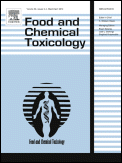
FOOD AND CHEMICAL TOXICOLOGY
Bridging disciplines for a healthier tomorrow.FOOD AND CHEMICAL TOXICOLOGY, published by Pergamon-Elsevier Science Ltd, is a prestigious journal with a significant impact in the fields of food science, medicine, and toxicology, reflecting its Q1 and Q2 quartile rankings in various categories as of 2023. Established in 1982, this journal continues to serve as an essential platform for disseminating high-quality research focused on the toxicological assessment of foods and chemicals, aiming to advance knowledge that affects public health and safety. With a pivotal role in integrating diverse disciplines, including pharmacology and agricultural sciences, the journal ranks impressively within the top percentiles—specifically 95th in Toxicology and 92nd in Food Science on the Scopus metrics. Though it operates on a traditional subscription model, the journal is committed to providing valuable insights and findings to researchers, professionals, and students across the globe, making it a vital resource in the ongoing discourse around food safety and environmental health. Its comprehensive scope underscores its importance in shaping evidence-based policies and practices.

Frontiers in Toxicology
Fostering Collaboration in Toxicology ResearchFrontiers in Toxicology, published by Frontiers Media SA, is a prominent open-access journal dedicated to advancing the understanding of toxicological science. Established in 2019, it serves as a vital forum for innovative research, offering insights into the pharmacological impacts and toxicological profiles of various substances. With its international reach based in Switzerland, this journal has quickly ascended in the academic community, achieving a notable Q1 ranking in Pharmacology, Toxicology and Pharmaceutics (Miscellaneous) and a Q2 ranking in Toxicology as of 2023. The journal is indexed in Scopus, where it ranks #8 out of 43 in its primary category, underscoring its influence and relevance in the field. The scope encompasses cutting-edge studies on the mechanisms of toxicity, including both human and environmental impacts, making it an essential resource for researchers, professionals, and students alike. By promoting open access to high-quality research, Frontiers in Toxicology plays a crucial role in enhancing knowledge sharing and fostering collaboration across disciplines.

Food Additives and Contaminants Part A-Chemistry Analysis Control Exposure & Risk Assessment
Empowering researchers to mitigate risks in food safety.Food Additives and Contaminants Part A-Chemistry Analysis Control Exposure & Risk Assessment, published by Taylor & Francis Ltd, is a leading journal in the field of food science, toxicology, and public health. With an ISSN of 1944-0049 and an E-ISSN of 1944-0057, this esteemed publication has established itself as a vital resource for researchers and professionals involved in the analysis and regulation of food additives and contaminants. Since its inception and through its converged years from 2008 to 2012 and again from 2014 to 2023, the journal has maintained an impactful presence, notably achieving a Q2 ranking in diverse categories including Chemistry (miscellaneous) and Food Science, alongside commendable standings in Health and Environmental Health. The journal’s mission is to foster high-quality research by providing a platform for critical studies related to chemical analysis, exposure assessments, and risk management in food safety. By prioritizing engaging, peer-reviewed content, it aims to enhance understanding and mitigate risks associated with food additives, making it an indispensable tool for academics, practitioners, and policymakers alike.